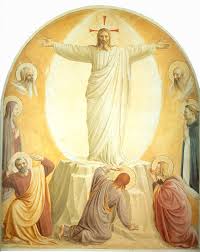Transfiguration and Holiness
mind particularly to the season of Lent. Instead, they seemed to me like a resume of religious life. How so?
Well, first there is that summons to leave behind what is familiar and known, and perhaps even comfortable – though I dare say Abram’s nomadic life might not have been all that cushy – and to go into the unknown (no indication where: just a land that I – God - will show you;)and surely entering religious life is like that: an alien land, where things are not as we have hitherto known them. You will also remember that a bit later Abram’s name is also changed – though not by much- as has happened to most of us here.
Then, in the second reading comes the call: to a holy life, not we are told - because of anything we have done, but because of God’s own purpose and grace; a ‘holy’ life, which, however, brings with it frustrations and disappointments, things we have to put up with, even if they do not measure up to -as Paul deems them - ‘sufferings on account of the Gospel’.
Finally, in the Gospel itself, we have a moment of transfiguration – just a moment, not a continual state of blissful joy and lasting unalloyed happiness, but a moment – short, surprising, unexpected, but vivid, undeniable, and surely memorable. .And surely, in religious life too, there are such moments. We have this reading again, of course, on the actual Feast of the Transfiguration, where it is like a summary ,or culmination, of what is around us: the shining summer sun; a sense of holiday (and Holy Day) and of general well-being. Here, however, at the beginning of Lent, it comes, as it were, out of the blue – it is in contrast, as such moments are, with the everyday world of our daily lives; it is only a moment, but one which makes sense of, and ratifies, our initial decision to become, like Abram, sojourners in an alien land, however bleak and desert-like (or maybe, of course, comfortable and safe) that land may have proved to be.
I said at the beginning that these readings did not make me think of Lent. But perhaps, since they made me consider Religious Life, they are, after all, Lenten. Because, like it or not, religious life is a life of giving up things for the sake of the gospel: things we surely value, like husband and children and family life, and creating a home and…whatever dreams we may have had whenever it was that we had them. I would want to say that we are given much in return – but the giving up remains.
However, as fasting in Lent, so giving things up in religious life, is not the be all and end all in either case. Lent is also a time for almsgiving, and to some extent at least our practice of poverty, of having all things in common, our – perhaps somewhat relative – frugality does enable us to give alms, individually perhaps, but rather as a community or congregation, and not just in Lent. And, of course, we are also recommended during Lent to pay particular attention to our life of prayer – and prayer, private and in common, is at the centre of our religious lives.
So there are parallels between the season of Lent, and our religious lives – both are, after all, preparations for Easter – the liturgical Easter which comes this year on Sunday April 16th. and the Easter of the final coming of God’s Kingdom, for which we pray each time we say the Our Father: that kingdom in which there will be not just a fleeting moment of transfiguration but a kingdom of justice and peace and joy; a kingdom where:'
'the dwelling place of God is with people, and He will live with us. And we will be His people, and God Himself will be with us as our God. He will wipe away every tear from our eyes, and there will be no more death or mourning or crying or pain, for the former things have passed away.” And the One seated on the throne said, “Behold, I make all things new.”
Amen! So let it be! And isn’t that an Easter worth looking forward to?
Sr Jadwiga o.p.
